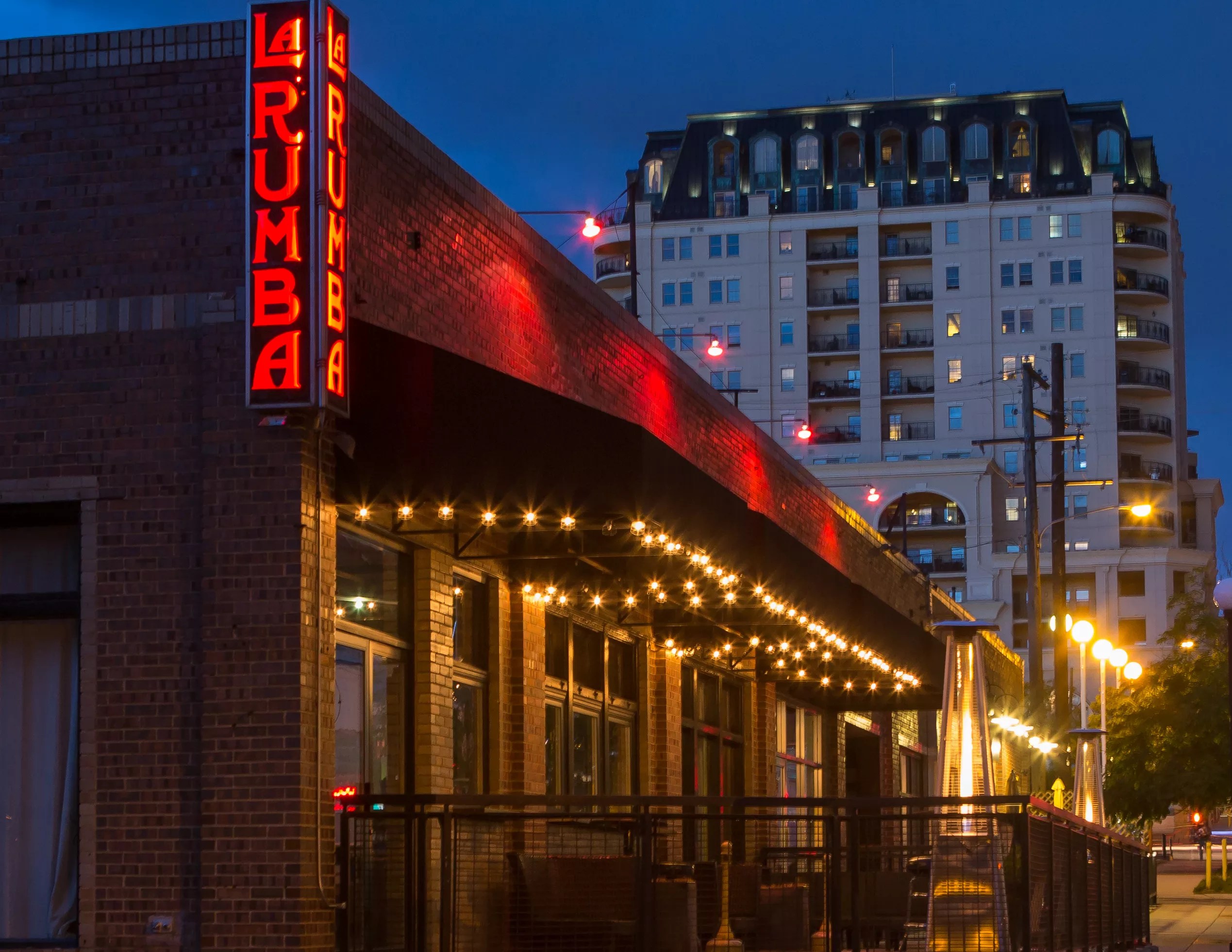
Courtesy La Rumba

Audio By Carbonatix
Denver Latin dance club La Rumba is celebrating 25 years in business with three nights of dance lessons and contests, DJs and drink specials starting Thursday, November 10. It’s hard to imagine that the building at 99 West Ninth Avenue was almost an Internet cafe.
La Rumba owner Chris Swank – who also owns Stampede, Goosetown Tavern, Mezcal and the Bluebird Theater – remembers roaming the Golden Triangle neighborhood one day in the late 1990s. He noticed that the 99 West Ninth Avenue location appeared to be preparing to open for some kind of business. “It was a professor from DU who was retiring,” Swank recalls. “It was his dream to open what was going to be an Internet cafe, music hall and restaurant.”
The professor eventually realized that he was in over his head, and offered the building to Swank if he agreed to pay off the debt that had accumulated during the upgrades. Swank agreed, and the club opened in 1997 as Ninth Avenue West, originally catering to the swing-music crowd during a late-’90s revival of the jazz style that was originally popular in the 1930s and 1940s.
“For two years, it was just huge,” says Swank. “It was just lines-out-the-door crazy, super fun. Brian Setzer played there, Big Bad Voodoo Daddy – all those bands from that era.”
But as fast as the swing revival went up, it came down, Swank recalls, and the club was suddenly scrambling for a different path forward. It had been doing salsa nights on Thursdays, which maintained fairly steady attendance. In 1999, the club’s name was changed to La Rumba as it became a Latin dance club. Swank says they weren’t sure whether they would draw enough of a crowd to stay open, but they were pleasantly surprised.
“It kind of just worked from the get-go,” Swank says. “We’ve been extremely lucky. The neighborhood has really grown up around us. It used to be literally parking lots everywhere. … Now we are surrounded by luxury apartments.”
La Rumba had to close down at the height of the COVID pandemic, but Swank says the bar used that time to redo the dance floor, the lighting and the color scheme. Once clubs reopened, he saw a rush of people eager to get back to salsa dancing. He also credits the staff at the club and general manager Danny Dawson with making the club the popular place that it is. “You have to have the people,” Swank says. “People are really a part of the formula.”
Although the club started off and found its success from salsa nights, it hosts a wide range of Latin music. Salsa can be a blanket term to describe the dance music that comes out of Latin America and the Caribbean, but more precisely, it’s a Cuban-influenced genre created in New York City in the 1960s. For its anniversary celebrations, La Rumba will also have bachata and merengue music from the Dominican Republic, cumbia from Colombia, and reggaetón from Puerto Rico. Swank says the club tends to focus on a different style each night in the interest of variety. And now he is constantly surrounded by Latin music, as one of his other clubs, Stampede, also specializes in the genre.
“I’m a fan of Latin America in general,” he says. “At one point I moved to Argentina and lived there with my family for about five years. The more I’m surrounded by it, the more I love all the different cultures of Latin America.”
The club brings in instructors and offers dance lessons earlier in the evenings on most days it’s open, and Swank says the lessons are an excellent icebreaker. “It’s a cool way to meet people,” he says. “We always get a good group of people early, and then at 8 p.m., we just open as a club.”
Swank says La Rumba draws a diverse crowd, and that’s what makes it special in a town like Denver, which can feel not quite demographically varied at times. Sunday nights tend to bring out the “serious, serious dancers,” he says, “the really serious dancers who are really great,” and La Rumba’s dress code seems to help draw out that community.
“There are people who really practice, and they dress up for it,” he says. “They wear the right shoes, and they like to go out and show off their moves.”
Swank adds that he sees people of all ages (above 21, at least) on that dance floor, as well.
“It’s very Latino in that way,” he says. “Your parents will go or your grandparents. Everybody feels comfortable here.”
Swank says he has been surprised at the longevity of the club, but Denver’s growth over the past 25 years and the influx of new residents has only had an invigorating effect on the space. He wants to continue doing business as usual for as long as people come out, and it appears that they are.
“There are not a lot of other clubs that are really doing exactly what we are doing,” Swank says. “It’s kind of unique. If you want to go salsa dancing, this is the place you are pretty much going to go to.”
For details about La Rumba’s anniversary celebration, visit larumbadenver.com.